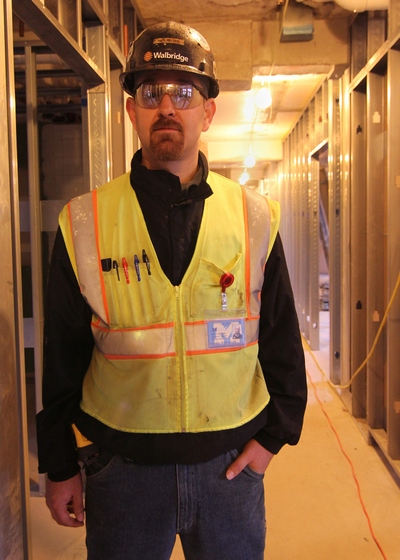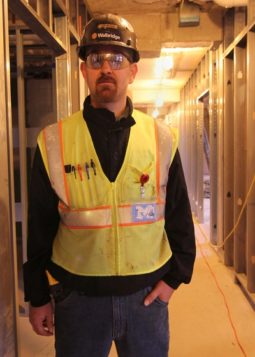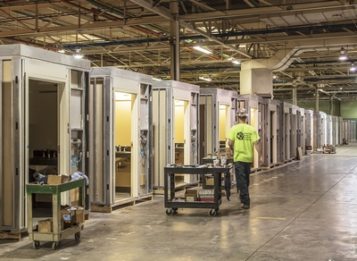
Mike Haller, Jr., superintendent at Walbridge, is overseeing work at a Walbridge modular production facility located 50 miles west of Detroit, Michigan. There, the company is constructing pre-fabricated bathroom units that will be shipped and installed at the Munger Graduate Residences, a project under construction at the University of Michigan.
(Q) What are you building?
We”re building modular bathrooms for the Munger Graduate Residences at the University of Michigan in Ann Arbor. We”re fabricating 730 private bathrooms for all the students who will live in this dorm. Our expected completion date for all units is December 2014.
(Q) Are they all the same type of unit?
We have five different models, including accessible units. Each one will have a fully tiled shower, toilet, sink, quartz tops, cabinetry, light fixtures, medicine cabinet; everything you”d find in a typical bathroom.
(Q) Describe your labor force.
We have 34 trades people fabricating these bathrooms. They are carpenters, laborers, tile setters, tile helpers, plumbers, painters and electricians. A lot of them love it out here. We”re inside a building where everything is controlled.
(Q) What’s the benefit of doing this inside a facility?
The biggest plus is the dorm is being constructed at the same time we”re building these bathrooms. Obviously, from a scheduling standpoint that has advantages. The quality is improved because we”re working in a controlled environment. And safety is enhanced because we”re not putting guys at risk by doing work on ladders. Most of the work here is done with feet on the floor or from benches.
(Q) What about movement of material?
It’s very beneficial to have materials close at hand. Just about everything is pre-cut and stacked nearby. Workers don”t have to carry material up stairs, so production is faster. We”ve also significantly cut down on waste. With drywall, we have the manufacturer cut it to a specific length. Plumbing comes to us cut to size. Waste leaving this facility has been reduced by 30-60 percent, depending on the material.
(Q) This definitely has an assembly line feel to it. How did you figure out the correct way to station framing, wall and floor assembly, tiling, etc.?
Walbridge has built more auto assembly plants than anyone else in the U.S., so we probably gained some insight there. They key is keeping everything moving in the right direction and not getting tied up at any single point. When we complete units, we shrink-wrap them, store them briefly and transport them by truck directly to the site.
(Q) What’s been the biggest challenge so far?
We showed our initial model to the university and architect and, as a result, some significant changes had to be made. But, it was good to deal with that right up front. Now we know exactly what we need to build and the university is ensured that these units are going to be constructed to their specifications. We can deliver that because we are the builder and we run the factory.
(Q) Do you test these units before they leave the plant?
We fill each unit with 1-2 inches of water and then let it sit there for 24 hours. That way we know the water-proof coating applied to the floor and tiles performs as required.
(Q) How does the owner feel about this?
The university is 100 percent behind us on the pre-fabrication of these modular bathrooms. We”re building them less than 10 miles from campus, so it’s easy for people to come out here and inspect the work. We”ve extended it even further at the building site where we”re using modular pipe racks and portions of the roof are modular.
(Q) Is this portable? Can you set up one of these mini-factories elsewhere?
Yes, we can. No matter where the owner and project are located, we can replicate this facility and system anywhere.
This Q&A was provided by Walbridge. If you are interested in submitting an interesting project that utilizes new or trending construction techniques, email cschmidt@informpublishing.com.




 Join our thriving community of 70,000+ superintendents and trade professionals on LinkedIn!
Join our thriving community of 70,000+ superintendents and trade professionals on LinkedIn! Search our job board for your next opportunity, or post an opening within your company.
Search our job board for your next opportunity, or post an opening within your company. Subscribe to our monthly
Construction Superintendent eNewsletter and stay current.
Subscribe to our monthly
Construction Superintendent eNewsletter and stay current.